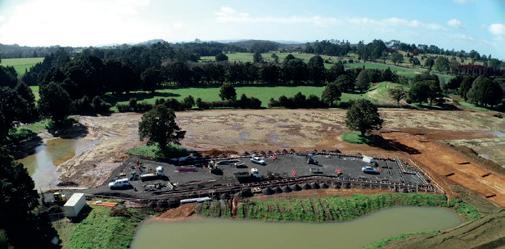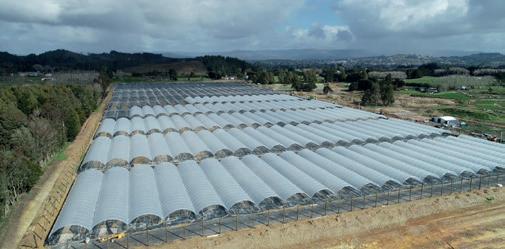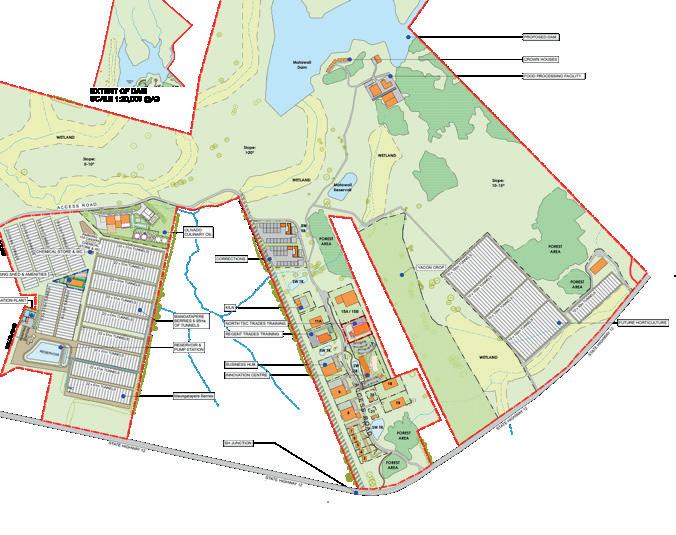
6 minute read
Connections central to innovation park's vision
Adding value to the land of the Far North has inspired the cultivation of an innovation and enterprise park with a special interest in local employment and sustainability.
The 240ha site of the Ngawha Innovation and Enterprise Park, about 3km east of Kaikohe in Northland, was purchased in 2018 after community consultation. Far North Holdings, the commercial and development arm of the Far North District Council, purchased the land on behalf of the community and began the feasibility and business case to develop the greenfields site. Now partnered with central government, local and national businesses, education and training agencies, research and development providers and a local hapū, the park in 2020 had six education and horticulture-based tenants signed on to begin construction. Opportunities are open for emerging crops, processing and value-added businesses to join the park as a centre of excellence for ingredients for the health and skincare market. Designed to create employment and provide education for the community and to enhance skillsets, particularly in horticultural and agricultural practices, Ngawha is growing into an example of the land diversification opportunities available to farmers and growers both within Northland and throughout the rest of the country. Stage one of the park’s infrastructure development began in November 2020. Farmlands’ shareholder Kaikohe Berryfruit LLP has 10ha of hydroponic tunnels going in, with plans for additional crops and manuka honey and oil processing. Olivado, the world’s largest producer of extra virgin and organic avocado oil, is due to start construction soon. An Education and Innovation Centre and Regent Training Centre are due to be finished in September 2022 and NorthTec’s Mid North campus will be operating in February 2023. Sue Dobbie, the “chief connector” for the park, has been involved since the get-go and has been part of the team behind making the park an attractive place to set up businesses. “Northland, particularly the Mid North, has a good climate, high-quality soils and a lot of things can be grown there. One issue is a lack of water so the Matawii Dam has been implemented as the first part of the Mid North water storage scheme,” Sue says. Just across the road from Top Energy, the park will also enjoy a cheaper electricity supply. Provincial Growth Fund money has funded infrastructure costs to open up the site. For Sue, a priority has been increasing employment rates within the community and making sure the businesses are getting the skillsets needed to succeed. “We are very focused on bringing in education and training based on what the businesses need. Instead of offering courses willy-nilly, the employers just need to tell us what they require in their workforce so that we can ensure their people are trained specifically for them. As well as standard NZQA qualifications, people will receive micro-credentials in recognition of their skills and training for their industry, for example horticulture,” Sue says. “We have a skills and employment coordinator on-site that works with businesses to get the information on who they are needing and then keeps an eye out for locals who can grow into those roles. There is active engagement between the community and the park.” Training opportunities will start with Regent Training Centre and NorthTec. Regent Training Centre, a private training organisation with campuses throughout Northland, will train 15 to 19-year-olds in trades on-site, while NorthTec will offer


higher-level trades courses and training in horticulture, automotive, welding and more. Regent Training students will aim to build six houses a year to be used as social housing within the community. “There is a lot of seasonal work associated with horticulture so we are also working on how to keep seasonal workers employed full-time by training them and connecting them to different employers across different crops as the seasons change,” Sue says. A centrally based Education and Innovation Centre will support a coworking space for businesses, regional economic development agency Northland Inc, Crown researchers and universities. ‘Hot desks’ will be available for staff needing to work within the Far North. “The Education and Innovation Centre will have access to meeting rooms, video conferencing and café spaces — it will be the beating heart of the park,” Sue says. While upping the employment rates in Northland, Ngawha will also support inmates transitioning from the Northern Regional Corrections facility through release-to-work programmes and eventually into permanent work upon release. “Released inmates are some of the most reliable workers so we have a relationship with Corrections to make sure they are meeting the needs of the employers so they can go into full-time work,” Sue says. Ngawha’s commitment to sustainability is a drawcard for attracting businesses. The park will run on a circular economy, with all waste being recycled for other uses. Olivado will run an anaerobic digester alongside their factory, creating a source of biomethane, heat and energy to run their trucks and factories. Green waste from the horticulture element of the park will also move through the digester and be recycled as liquid fertiliser with minerals added in. With more closed-loop manufacturing opportunities in the park, less raw produce from Northland will need to travel over the Auckland Harbour Bridge to be processed. “The central reason for the park is to encourage more value-add manufacturing. We don’t have much manufacturing infrastructure in Northland so are really starting from scratch but it means we can show farmers and growers how to grow the value of crops from scratch as well,” Sue says. “Ngawha is also not your typical industrial site. There has been very sensitive development amongst the native trees and wetlands in the area. Of the 67 endangered tree species in Aotearoa, we have 63 species on-site. Before any trees were felled, mana whenua have collected seeds, raised them in a nursery at the Corrections centre and they will be planted back on-site. “Local whānau are closely involved and Ngawha is designed to be a place of wellbeing for everyone who works there – it needs to feel like it belongs to the community.” Farmlands has embraced the chance to connect farmers and growers to the land diversification and value-add opportunities. Northland Technical Advisor Matt Punter has worked closely with Northland Inc. and farmers in the region through the Kaipara Kai programme and was a catalyst to cultivating the relationship with Ngawha Park. “Farmlands have partnered with Kaikohe Berryfruit LLP offering technical support and product stewardship. It's great to be part of a sustainable innovation and the future proofing of the horticultural sector. Farmlands are committed to offering sustainable and more eco friendly solutions," Matt says. “Our technical expertise offers a support network to farmers and growers taking on the diversification opportunity – Ngawha can show that your ideas can be a reality.” With stage one due to be completed by the end of 2022 and stage two still to come, the Ngawha Innovation and Enterprise Park is a glimpse into the future and of exciting opportunities to come.










